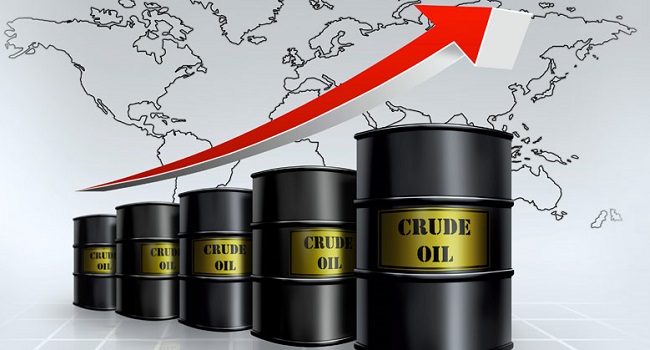Business
Oil soars past $70 on the back of US-Iran tension: What it means for Nigeria’s 2020 budget

Oil prices rose by over one per cent on Monday as escalation in the tension between Tehran and Washington, following the assassination of top Iranian commander last Friday, lifted the global benchmark Brent beyond $70 per barrel.
Brent surged $70.74 per barrel, its highest in three months, up by 78 cents from Friday’s settlement before easing to $69.17 at 17:10 West Africa Time (WAT).
US West Texas Intermediate (WTI) crude eased $63.64 a barrel up by 59 cents or 0.9 per cent after peaking for the day at $64.72, the highest since last April.
There are possibilities that the gains might extend further in the days ahead given the retaliatory threats from Iran that severe penalty awaits the perpetrators of the killing, and considering Donald Trump’s counter threat that 52 Iranian cultural sites (one for each of the 52 Americans taken hostage by Iran during an attack on the US embassy in Tehran in 1979) should Iran attack any American subject.
Trump had, according to Reuters reports, threatened to impose sanctions on Iraq, itself the second largest oil producer among OPEC members, if US troops were forced to leave the country. Earlier Baghdad had asked American troops to withdraw from the country.
The heightening concerns about the conflict in the Middle East could impact global oil supplies severely in the next few days. The region is currently responsible for roughly half of the world’s oil production while one fifth of the global oil shipments is channelled through Strait of Hormuz located between the Persian Gulf and the Gulf of Oman.
Nigeria’s 2020 budget is premised on daily oil productions of 2.18 million barrels benchmarked at $57 per barrel. Interestingly, Nigeria’s crude is priced against Brent, which has risen by over 5 per cent since Friday, meaning that deteriorating conflict in the Middle East could prove a disguised blessing for the nation.
A couple of international relations pundits on Monday said the biggest impact of General Qasem Souleimani’s death so far, which is increase in oil prices, is beneficial to Nigeria.
An international relations expert at the University of Lagos, Henry Ogunjewo, observed that the more bilateral relations between Iran and the US aggravates, the more its impact on oil prices.
“Nigeria is already benefitting from the crises because oil prices have increased and we won’t be surprised if some top officials start earning more as a result of this.
“The longer the crises lingers, the more its effect on oil prices,’’ he remarked.
Read also: CBN releases guidelines for managing risk in payment systems
A professor of History and Strategic Studies, David Aworawo, opined that engendered instability was a direct repercussion of the US-Iran tensions.
“The extent and duration is unknown but we definitely know that it will create some level of instability in the next couple of weeks.
“Iran has threatened to attack some American facilities and the U.S. will respond by punishing Iran.
“The actions and reactions of both countries will determine the long term consequences,’’ he noted.
Iran said it would no longer honour the terms of the 2015 nuclear agreement it signed with world powers.
Michael Pearse, senior US economist at Capital Economics said oil prices will “likely rise much further if Iran retaliates, either by attacking Saudi oil facilities as it did in September, or attempting to block the Strait of Hormuz, through which 20 per cent of global oil supply is transported.”
Join the conversation
Support Ripples Nigeria, hold up solutions journalism
Balanced, fearless journalism driven by data comes at huge financial costs.
As a media platform, we hold leadership accountable and will not trade the right to press freedom and free speech for a piece of cake.
If you like what we do, and are ready to uphold solutions journalism, kindly donate to the Ripples Nigeria cause.
Your support would help to ensure that citizens and institutions continue to have free access to credible and reliable information for societal development.


















